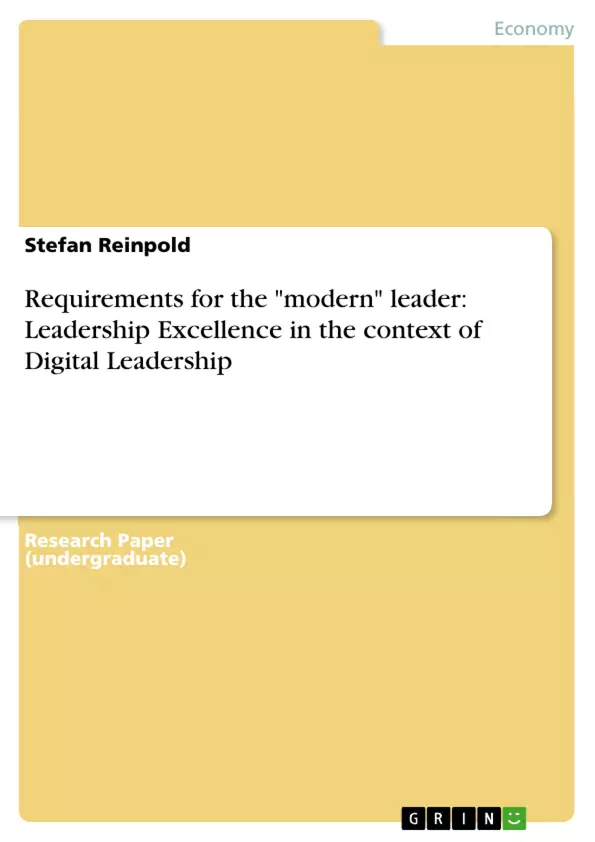In this work on the topic of Digital Leadership Excellence, the theoretical basics are explained at the beginning, the concept of leadership is defined more precisely, but classic models with regard to leadership roles, leadership dimensions and leadership approaches are also examined in more detail. The megatrend of digitalization and the associated need for special evaluation models for virtual teams will then be presented. Based on this, it is derived to what extent these theories are still valid in times of the VUCA environment.
Inhaltsverzeichnis (Table of Contents)
- 1. Introduction
- 2. Theoretical foundations
- 2.1 Importance of Leadership & Leadership Roles
- 2.2 Competence profile of a manager and leadership dimensions
- 2.3 Classic management approaches
- 2.3.1 Person-centered leadership approaches
- 2.3.2 Behavioural leadership approaches
- 2.3.3 Situation-oriented management approaches
- 2.3.4 Interaction-oriented leadership approaches
- 2.4 Digitalization as the most important megatrend
- 2.4.1 Influence of digitalization
- 2.4.2 Evaluation in virtual teams
- 3. Changed requirements for managers
- 3.1 Shifts in competence
- 3.2 Roles of a manager
- 3.3 Changed management approaches
- 3.4 Changed management tasks
- 4. Conclusion
Zielsetzung und Themenschwerpunkte (Objectives and Key Themes)
This study thesis examines the requirements of “modern” leaders in the context of digital leadership. It defines the concept of leadership, explores classic models of leadership roles, dimensions, and approaches, and investigates the impact of digitalization and its implications for leadership in a VUCA environment. The work aims to understand how these theories apply in the face of changing demands on managers and to identify the altered requirements placed upon modern leaders in this evolving landscape.- The importance and evolving nature of leadership in a dynamic business environment
- The impact of digitalization as a megatrend on leadership roles and approaches
- The shifting competence profile and roles of managers in the digital age
- The need for special evaluation models for virtual teams
- The adaptation of traditional management theories to the VUCA environment
Zusammenfassung der Kapitel (Chapter Summaries)
- Chapter 1: Introduction: This chapter introduces the concept of digital transformation and its impact on companies in the modern business landscape. It highlights the increasing competitive pressure and the need for organizational adaptation, particularly for managers operating in a VUCA environment. The chapter emphasizes the transition from authoritarian leadership to a more collaborative and motivating approach.
- Chapter 2: Theoretical foundations: This chapter delves into the fundamental concepts of leadership, defining the term, exploring various leadership roles, dimensions, and approaches. It also examines the significance of a manager's competence profile and the influence of digitalization on leadership models and evaluation in virtual teams.
- Chapter 3: Changed requirements for managers: This chapter focuses on the shifts in competence, roles, and management approaches necessary for effective leadership in the digital age. It explores how management tasks have evolved in response to the changing demands of the VUCA environment.
Schlüsselwörter (Keywords)
This study thesis examines the evolving nature of leadership in a digitalized world, focusing on leadership excellence, digital leadership, competence profile, management approaches, virtual teams, and the VUCA environment. It explores concepts like digital transformation, leadership roles, and the influence of megatrends on modern leadership practices.Frequently Asked Questions
What is "Digital Leadership"?
Digital Leadership refers to leadership styles adapted to the digital age, focusing on collaborative, motivating approaches rather than traditional authoritarian models.
What does the term VUCA environment mean?
VUCA stands for Volatility, Uncertainty, Complexity, and Ambiguity, describing the dynamic and unpredictable nature of the modern business world.
How does digitalization affect leadership roles?
Digitalization shifts the focus toward managing virtual teams, requiring new competence profiles and flexible management tasks.
What classic leadership approaches are examined?
The study examines person-centered, behavioral, situation-oriented, and interaction-oriented management theories.
Why are virtual teams a specific challenge for leaders?
Virtual teams require special evaluation models and different communication strategies compared to traditional face-to-face teams.
- Citation du texte
- Stefan Reinpold (Auteur), 2017, Requirements for the "modern" leader: Leadership Excellence in the context of Digital Leadership, Munich, GRIN Verlag, https://www.grin.com/document/1180583



